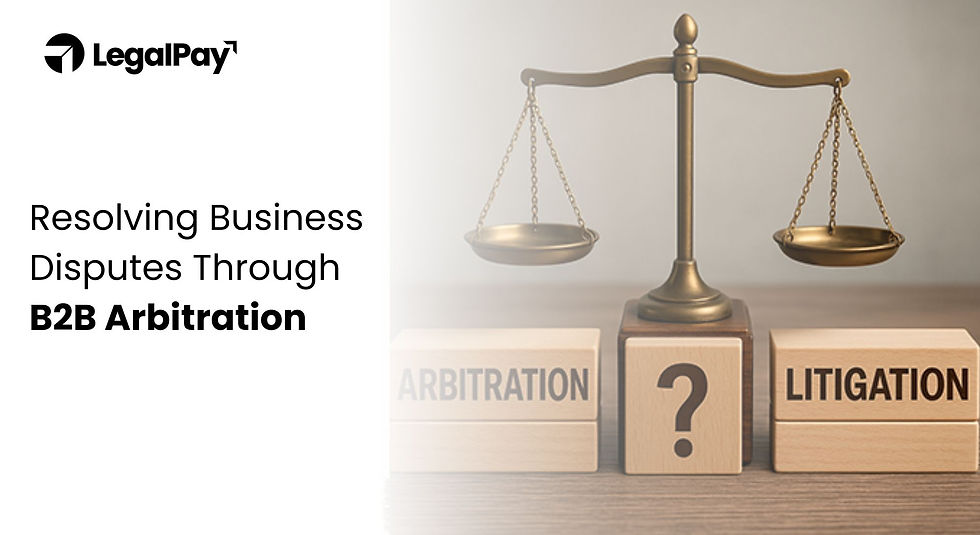Pre-Institution Mediation is Mandatory: Supreme Court
- LegalPay

- Sep 30, 2022
- 3 min read

Introduction
In a significant ruling, in the case of Patil Automation Pvt. Ltd. v. Rakheja Engineers Pvt. Ltd., the Hon’ble Supreme Court of India has held that pre-institution mediation under Section 12A of the Commercial Courts Act, 2015 (hereinafter referred as “the Act”) is mandatory in nature and suits not adhering to it would be liable to be rejected under Order VII Rule 11 of the Code of Civil Procedure, 1908 (hereinafter referred as “CPC”).
Legislative Position
The Act was enacted in the year 2015 with the objective of achieving speedy adjudication of Commercial Disputes. As per Section 12A of the Act, any suit, which does not contemplate any urgent interim relief under the Act, shall not be instituted unless the plaintiff exhausts the remedy of pre-institution mediation. Such mediation has to be done before the authorities authorized by the Central Government, which have to complete mediation within 3 months. The period can be further extended by two months with the consent of the parties. This mandatory mediation period is not counted for the purposes of limitation under the Limitation Act. As per sub-section (5) of Section 12A, any settlement arrived at the mediation can be executed as if it was an award passed under the Arbitration and Conciliation Act, 1996.
Background of the Case
In the case before the Hon’ble Court, the appellants had sought the rejection of the plaint under Order VII Rule 11 of CPC on the ground that the suit was filed by the respondents without exhausting the remedy of pre-litigation mediation. However, the Commercial Court dismissed the application to reject the plaint. The Supreme Court then considered the case along with a host of other appeals raising the same issue.
The decision of the Court
Answering the issue in the affirmative, the Hon’ble Court has declared that pre-institution mediation under Section 12A of the Act is mandatory. Insertion of Section 12A in the year 2018 makes it clear that the Parliament intended to give it a mandatory flavour, therefore, it is not a mere procedural provision. It further held that the suits which are filed violating this mandate are liable to be rejected at the threshold, under Order VII Rule 11 of the CPC. This power can be exercised even suo moto by the court. This declaration was made effective on August 20, 2022. Furthermore, the Hon’ble Court directed that a matter cannot be reopened on the basis of this declaration in cases wherein the plaints have already been rejected and no steps have been taken within the period of limitation. Furthermore, if the order of rejection of the plaint has been acted upon by filing a fresh suit, the declaration of prospective effect will not avail the plaintiff. Finally, if the plaint is filed violating Section 12A after the jurisdictional High Court has declared Section 12A mandatory, the plaintiff will not be entitled to the relief.
LegalPay to the rescue
This ruling by the Hon’ble Court promotes mediation in the country to make the country a hub for easy settlement of disputes outside the Courts. Any settlement arrived at the mediation can be executed as if it was an arbitration award. However, the parties often worry about the costs associated with these out-of-court settlements. That is exactly where Third Party Litigation Funding comes in, as a saviour for both claimants as well as the lawyers. Just a few decades ago, Third Party Litigation Funding fell into the grey area. But now, Third Party Litigation Funding has become a prominent concept, recognised by all. LegalPay not only deals with mainstream court-related expenses but also provides assistance during the settlement phase, including but not limited to mediation and arbitration.
Conclusion
Pre-institution mediation has been mandated only in a class of suits which do not contemplate any urgent interim relief. The carving out of a class of suits and selecting them for compulsory mediation is done to lighten the load on the judges and to attain the object of the law. Mediation is a “meaningful choice” in the era of docket explosion. With the increase in population and a skewed Judge-population ratio and a huge spiralling of litigation in the courts, it is only logical and imperative, to attempt and persevere in ‘out of the box thinking. With this illuminating approach, there also comes a small bump on the road, to meet the expenses related to mediation. But LegalPay, with its Litigation Funding product, shifts the burden of finance upon itself and gives the parties access to speedy justice.




Comments